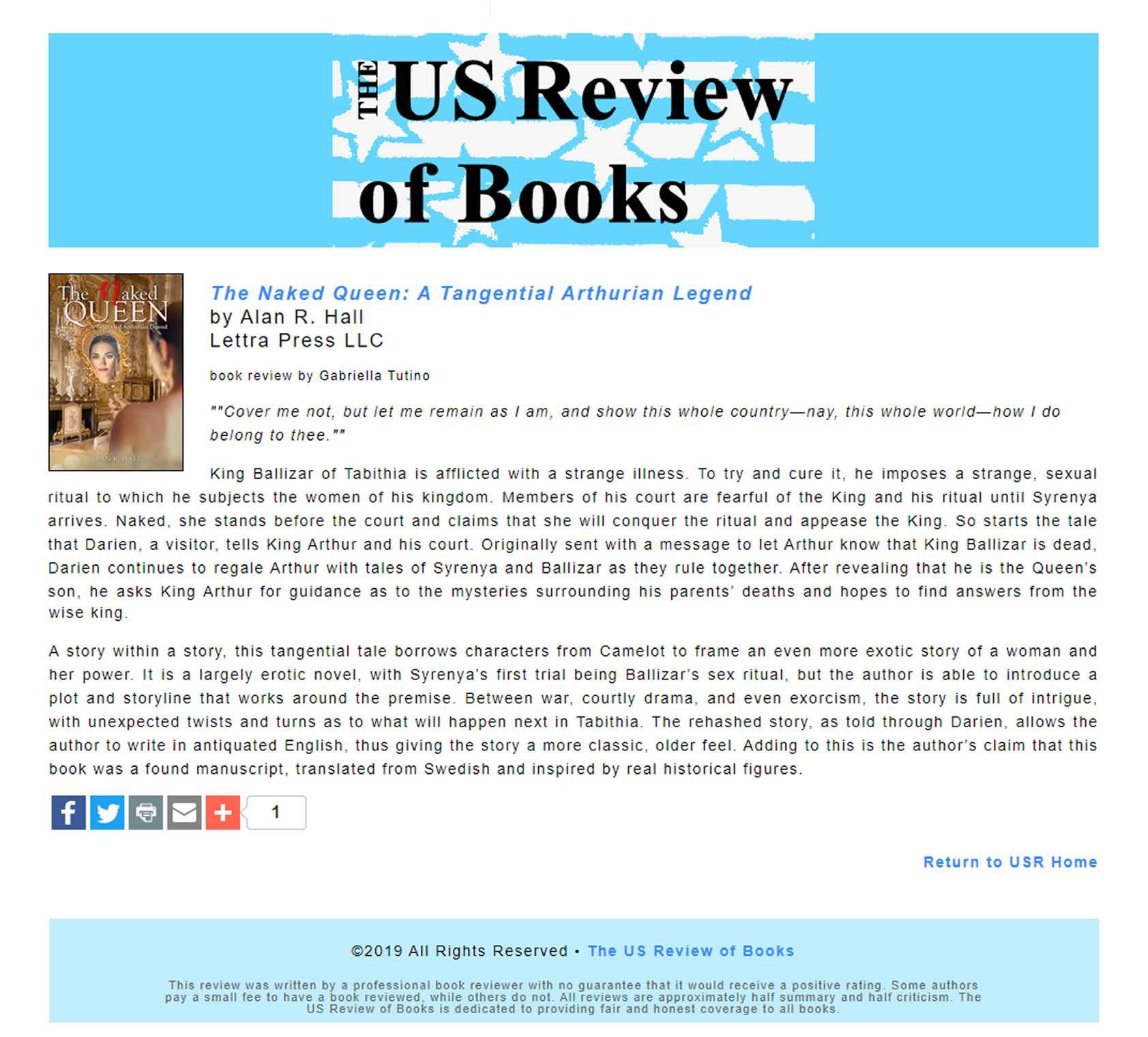
6 minute read
Questions and Answers
from Alan R. Hall
1. When did it dawn on you that you wanted to
be an historical fiction writer? It never occurred to me. I started out just trying to write a short story about demonic possession; the thing grew and grew until it had taken on a life of its own. Characters started popping up like weeds. By the time I was anywhere near finished, it was novel length. But intentions? There were none.
Advertisement
2. As a librarian, you surely have read a lot of books. Do you still remember the first
historical novel you’ve ever read? Very clearly. I was in middle school, and this baby was a TOME. I’m talking several hundred pages. It was named “The Casket and the Sword,” but as far as the author is concerned, I have no idea. The book is long out of print now; it’s been forty years since I looked for it again and it was out of print then. But it was absolutely delightful and I couldn’t put it down. I remember my mother saying, “I never thought I would hear myself say this, but could you please put your book down and eat your dinner?”

3. Can you share how being a librarian has
made you a better writer? Actually, I was a bookseller before I was a librarian. And learning what people liked and wanted to read was very helpful. Then, later, I was able to take that knowledge and go find these books that everyone was reading, and see for myself what the attraction was. I discovered I was a big mystery fan: Ellery Queen, The Saint, James Bond, analyzing a problem and finding the answer, regardless of how bizarre the actual truth was. But no one held a candle to Sherlock Holmes. I was so enamored of the genre that I actually formed a Scion Society of the Baker Street Irregulars!
5. Do you have a particular approach to
research and writing? It’s pretty much a matter of figuring out what the question is, and going to find the answer for it. For example, in the big battle scene, I needed cannon. And if I was going to have cannon, I needed gunpowder. So I had to prove to myself that gunpowder did actually exist in the 1100’s. Sure enough, with very little time to spare! China first created it, and it spread across Europe and into Scandinavia right around the beginning of the twelfth century.
6. Are you currently writing a prequel or sequel
to The Naked Queen? Well, that’s an interesting question. What I’m writing at the moment is a companion piece to The Naked Queen. The events of the new book are not a part of the first book, but they do take place during the same time period, and to the same characters. It’s more of an explanation of what happens in TNQ than it is a prequel or sequel to it. The terms just don’t fit. 7. You’ve worked as a bookseller for some time. What do you think are the key selling points of The Naked Queen? What do you think will attract readers to your book? Selling points: well, it is a good adventure story. Above all else, this is the basic theme. But even though this is a book written of the time many other authors have also chosen to write in, this book could never have been written before 2018. There is far too much going on that challenges the time of the novel. It’s not that an author like, say, Arthur Conan Doyle couldn’t have written this book. It’s that ACD could not have conceived of this book. So in that regard, it is a very fresh approach.
8. What’s been the hardest scene to write in
The Naked Queen? The exorcism. I knew how it was going to start and I knew how it was going to end. But connecting the two ends was far more difficult than I had imagined. It took many more rewrites than any other part of the book, and it was only one chapter. Shucks, it was only one scene! But I finally figured out that I was missing a character. So Michael was born, simply so he could do exactly what he did in the exorcism. Problem solved!
4. How do you cope with writing the dialogue of times gone by? Frankly, I prefer the structure and color of the older language to today’s AmeriKing’sLish. It’s more fun. It’s subtler. If you thought that diagramming sentences when you were learning your middle school English was bad, try dismantling a sentence that might mean something entirely different from what you intended, simply because your coloring is off!
9. Writers are often influenced or inspired by their muses. What
are your thoughts on that? I was far more influenced by the Muses when I was writing poetry. I haven’t written poetry in years. The only muse one really has in writing a novel is that you get it right. If it’s not right, it’s not finished.
10. I know you have been a theater critic for a long time. How much has that experience helped
you write your novel? The art of seeing something, whether it’s on the stage or in your head, and then having to sit down and describe it for someone who has no idea what you’re talking about. That constant necessity to rework, streamline, summarize, and tantalize, and also knowing when to quit (if you give away too much of the play, you’ve created a “spoiler alert”) is extremely good practice for writing a novel. And it does wonders for your characters. If you can imagine your work, and see your characters reading their lines, then you begin to figure out what that character would do in a given situation. It helped my characters “speak to me.”

11. Which characters in this book really
spoke to you? Actually, the first one to actually speak to me was one of the more minor characters, Alissa (I bristled visibly when one rather cavalier book reviewer called her “one dimensional”). I was writing a scene and I realized she was on the verge of tears. It took me a little bit of time to figure out why, but the answer to that question made that scene.
12. How important to you is historical accuracy
in a work of fiction? That’s the nice thing about fiction. You make it up. Your reality is what you make of it. Especially in a fantasy novel, if you create a world and the parameters for living in that world, then boom! Things start to fit.
13. Do you want The Naked Queen’s characters to live on the silver screen. Or do you think it’s best to keep it as a book
to be read? I can honestly say that I cannot imagine an author saying no to having his book made into a movie. But I don’t have any illusions about it. I fully understand that, by the time the film hits the theaters, it can and probably will be a long way off from the novel that spawned it. But I would love to see a company try to make a movie out of this book; it presents some rather interesting challenges for the movie maker!
14. What’s next for you? Do you have any upcoming book signings? Are you
joining literary events? Well, right now, the only thing on the horizon is the annual Miami International Festival of Books, that takes place on the Miami-Dade campus in Florida Nov. 22-24. We are rolling out what I call a new edition of TNQ. It has a new cover, which much more reflects the title, than the original. And it has a lower price! That’s always good news for readers. I am negotiating some readings and book signings, but these are with individual bookstores, and nothing’s final yet.

Available at








